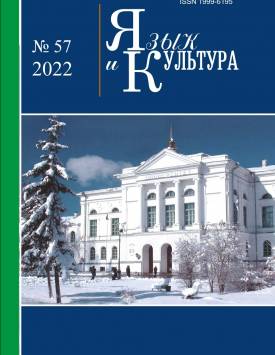Trans-Baikal Chinese language school and cultures: history and modernity
The article is devoted to the history of the formation and development of the school of the Chinese language in Transbaikalia, which laid the foundation for the study of the language and culture of China by the population of this region. The aim of the study is to identify the objective and subjective prerequisites for the creation of the Trans-Baikal school of the Chinese language, which was created on the basis of the Chita State Pedagogical Institute named after N.G. Chernyshevsky, as well as her place and role in the study of the language and culture of China not only in the Trans-Baikal region, but also in Russia. It is important to show the continuation and development of the traditions of the Chinese language school at the present stage of its development. The article is supposed to deduce the formation and features of the regional (Transbaikalian) Russian-Chinese colloquial speech. The article examines the modern international Russian - Chinese cooperation in the field of terminological, psycholinguistic and other studies aimed at expanding cultural, economic and trade ties between neighboring countries. The authors identified the objective and subjective prerequisites for the study of the Chinese language in the region, which were formed in Transbaikalia over a long historical time. The authors come to the conclusion about cultural-geographical and economic-geographical determinism as factors that determined the area of study of the Chinese language and culture by the population of the Trans-Baikal Territory. The features of the formation of Russian-Chinese colloquial speech in Transbaikalia, which included other languages, the so-called intermediary languages, are revealed. The spontaneous formation of the Russian-Chinese pidgin as a means of communication is noted - a mixture of phonetically and grammatically distorted Chinese and Russian words, which, in turn, was subdivided into other varieties. The peculiarity of the Kyakhta Russian-Chinese pidgin is noted by the presence in it of some borrowings from the Mongolian language. The history of the Kyakhta school (Republic of Buryatia), the first Russian school for training translators of the Chinese language, is covered. The authors note the continuation of the traditions of the Trans-Baikal school of the Chinese language in modern conditions, the development of Russian-Chinese scientific cooperation in the field of terminological research, in which the Chinese language acts as an object and subject of scientific interest, as well as psycholinguistic research, in particular, on the influence of this language on cognitive abilities of Russian-speaking younger students.
Keywords
Chinese language, Chinese culture, Russian-Chinese pidgin, Chita State Pedagogical Institute named after N.G. Chernyshevsky, Trans-Baikal State University, Russian-Chinese terminology, psycholinguisticsAuthors
| Name | Organization | |
| Ochirov Osor R. | Plekhanov Russian University of Economics | otchirovossor@mail.ru |
| Vasilyeva Klavdia K. | Research Institute of the Federal Penitentiary Service of Russia | klavdiya5@yandex.ru |
References

Trans-Baikal Chinese language school and cultures: history and modernity | Yazyk i Kultura – Language and Culture. 2022. № 57. DOI: 10.17223/19996195/57/7
